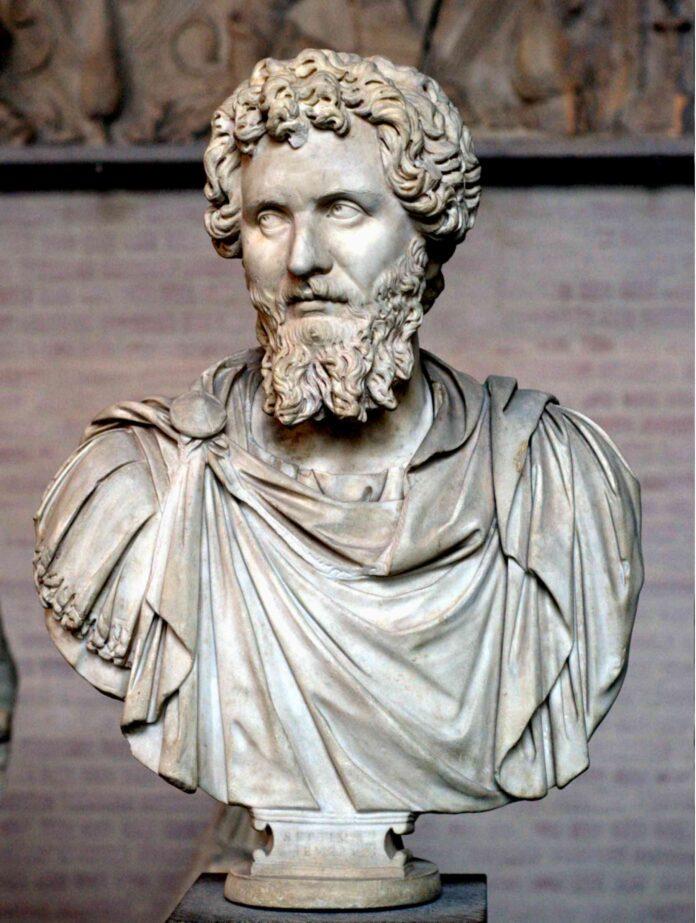Life of Severus: The first African-born Roman emperor named Lucius Septimius Severus. Severus was born on 11 April 145 AD, to a prominent rich family of Leptis Magna (present-day Libya). He came to Rome when he was 18. Although Severus was African, his skin color was not as dark as most people of Libya’s descendants.
Severus Septimius Political Life
In 173 AD Severus was granted entry into Rome cursus honorum, a senatorial rank, after his cousin, Gaius Septimius Severus had recommended him to Emperor Marcus Aurelius in 170 AD. He subsequently rose into political powers under the reigns of Emperor Marcus Aurelius and his successor Emperor Commodus. He was also honored with a senior position in the Roman Army after his cousin became proconsul of the Province of Africa.
In AD 191, Severus was appointed governor of Pannonia Superior, a province on the Danube frontier, covering parts of today’s Hungary, Austria, and Bosnia, by the then-emperor Commodus. The following year Commodus was assassinated and in AD 193 his successor Publius Helvius Pertinax was declared emperor, heralding the Year of the Five Emperors – a time in which five men claimed the title of Roman Emperor. But Pertinax’s reign lasted only 86 days as he was assassinated by Praetorian Guards who were unhappy with his effort to enforce stricter discipline.
Emperor Severus Septimius Life as The First Africa Born Roman Emperor
Severus seized power after the death of the emperor Pertinax, he also killed the incumbent emperor Didius Julianus as revenge for the death of Pertinax and became the Roman emperor in AD 193
His forces sacked the Parthian capital city of Ctesiphon and added the northern half of Mesopotamia to the empire. For his efforts, a Triumphal Arch was erected in Severus’s honour in the Roman Forum.
Severus fought several of his rival territorials, like the Roman generals Pescennius Niger and Clodius Albinus. By 194, Niger defeated in Cilicia’s Battle of Issus. Later that year, Severus went beyond the eastern boundary on a brief punitive war, annexing the Kingdom of Osroene as a new province.
Severus enlarged the Roman Empire further with campaigns in Africa and Britain. Severus went to Britain in 208, reinforcing Hadrian’s Wall and retaking the Antonine Wall. He invaded Caledonia (modern Scotland) with a 50,000-man army in AD 209. He fell short of his ultimate goal of bringing the whole British island under his rule when his plans were cut short by an infectious disease in late 210.
The African Roman emperor, Septimus Severus was known for the militarization of the government, growing Oriental influences in society, and high development of civil law.
Severus Family Life
About 175, Septimius Severus, in his early thirties married his first wife, Paccia Marciana, a woman from Leptis Magna. A woman he met during his tenure as legate under his uncle. She had died in 186 AD before he became an emperor. He had only two daughters with her. It appears that the marriage produced no surviving children, despite lasting for more than ten years. Severus went on to commemorate Marciana with statues when he became emperor.
Septimius Severus, now in his forties, childless and eager to remarry, began enquiring into the horoscopes of prospective brides. It was then he heard of a woman, Julia Domna in Syria of whom it had foretold that she would marry a king, and so Severus sought her as his wife.
By 187, he married Julia Domna an Emesene Syrian woman whose father served as a high priest to the local cult of the sun god Elagabal. Julia Domna had two sons with the African born Roman Emperor. Her elder sister Julia Maesa went on to become the grandmother of Elagabalus and Alexander Severus, future emperors of Rome
How The First African Born Roman Emperor Severus Died
It was in Roman Britain that Severus would see his final days. Ill health, most likely caused by gout, took a toll on the emperor. He passed away on 4 February 211 AD at the age of 65. On his deathbed, he gave the following advice to his sons; “Be good to one another, enrich the soldiers, and damn the rest”. It was his treatment of the soldiers that did indeed secure Severus’s reign. His military reforms saw wage increases for soldiers along with the removal of the marriage ban on soldiers. His treatment of the army would become a model that future emperors would emulate.
Severus had also been popular amongst the Roman people, having brought stability after the vices and corruption of Commodus’s reign. He also left behind an empire spanning some 5 million square kilometres, the largest it had ever been.

